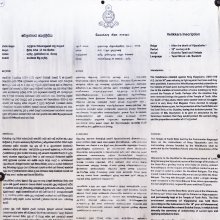Pash, Paś, Paṣ, Pāś: 9 definitions
Introduction:
Pash means something in Hinduism, Sanskrit, Hindi. If you want to know the exact meaning, history, etymology or English translation of this term then check out the descriptions on this page. Add your comment or reference to a book if you want to contribute to this summary article.
The Sanskrit terms Paś and Paṣ and Pāś can be transliterated into English as Pas or Pash, using the IAST transliteration scheme (?).
Images (photo gallery)
Languages of India and abroad
Sanskrit dictionary
Source: DDSA: The practical Sanskrit-English dictionaryPaś (पश्) or Paṣ (पष्).—1 U.
1) To oppress.
2) To touch; L. D. B.
See also (synonyms): pas.
--- OR ---
Paś (पश्).—1 P. To bind (pāśayati); L. D. B.
See also (synonyms): pas.
--- OR ---
Paṣ (पष्) or Paś (पश्).—1 P. To go, to touch (paṣayati, but with upasarga, paṣati e. g. prapaṣati); L. D. B.
--- OR ---
Pāś (पाश्).—9 P.
1) To eat, consume, devour, feed upon.
2) To taste; वैश्योऽद्भिः प्राशिताभिस्तु (vaiśyo'dbhiḥ prāśitābhistu) Manusmṛti 2.62.
3) To enjoy, sport with.
4) To drink.
Source: Cologne Digital Sanskrit Dictionaries: Shabda-Sagara Sanskrit-English DictionaryPaś (पश्).—[(ṣa-sa)] r. 1st cl. (paśati-te) r. 10th cl. (pāśayati-te paśayati-te) 1. To bind, to fetter. 2. To knot or tie. 3. To go, to move. 4. To hinder or obstruct. 5. To touch. bādhe bhvā, pakṣe ada0 bandhe-cu-ubha-saka-seṭ.
--- OR ---
Paṣ (पष्).—[paṣa] r. 10th. cl. (pāṣayati paṣayati) 1. To bind, to tie. 2. To move. 3. To oppose, to hinder. 4. To touch.
--- OR ---
Pas (पस्).—[pasa] r. 1st. and 10. cls. (pasati-te pāsayati pasayati) 1. To bind, to fetter, to tie, to string. 2. To touch. 3. To oppose, to obstruct, to hinder. 4. To go, to move. 5. To injure or kill. (i) pasi r. 1st and 10th. cls. (paṃsati paṃsayati-te) To annul, to annihilate or destroy. cu-ubha-sakaseṭa-idit .
Source: Cologne Digital Sanskrit Dictionaries: Benfey Sanskrit-English DictionaryPaś (पश्).—i. 10 pāśaya, [Parasmaipada.] To bind. pāśita, Bound, [Harivaṃśa, (ed. Calc.)] 3536.
— With the prep. ava ava, ptcple. of the pf. pass. avapāśita, Bound, [Rāmāyaṇa] 3, 59, 18; cf. dṛś, and spaś.
— Cf. probably [Gothic.] fahan; [Anglo-Saxon.] fón with feng; [Old High German.] fahan with fang, fôgjan; [Anglo-Saxon.] fegan; [Gothic.] fahjan; [Old High German.] gafagjan; [Anglo-Saxon.] ge-fegan; [Latin] pac in paciscor, dispesco for dis-pec + sco, compesco.
--- OR ---
Paṣ (पष्).—i. 1, [Parasmaipada.] [Ātmanepada.], v. r. of spaś, q. cf. i. 10, paṣaya, [Parasmaipada.] 1. To bind. 2. To hinder. 3. To touch. 4. To go (v. r. paś). i. 10, pāṣaya, [Parasmaipada.] To bind (v. r.).
--- OR ---
Pas (पस्).—i. 1, [Parasmaipada.] [Ātmanepada.] v. r. of spaś, q. cf. i. 10, [Parasmaipada.] pāsaya, To bind (v. r.)
Source: Cologne Digital Sanskrit Dictionaries: Cappeller Sanskrit-English DictionaryPaś (पश्).—1. only [present] paśyati, only [present] paśyate (cf. spaś & dṇṣ) see, behold, perceive, look, look on, try, examine, ponder; regard or consider as, take for (2 [accusative] or [accusative] & [adverb] in vat), see with the spiritual eye (of seers and poets), find out, invent.
— ati look beyond. anu look at, behold, discover, regard or consider as etc. = [Simple] ava look at, observe. ud look up, foresee, expect, behold, perceive. pari look over, survey, descry, discover, learn, understand, know as (2 [accusative]). pra look forward, foresee, view, behold, know, recognize, take for (2 [accusative]). prati look at, behold, experience, learn. vi see in different places or in detail, discern, distinguish; perceive, observe, know, understand. abhivi behold, perceive. sam see (together or at the same time), look over, survey, observe, consider, try, examine, perceive, behold, know, understand; [Middle] look at each other, be together.
--- OR ---
Paś (पश्).—2. (only [instrumental] paḍbhis) look, eye.
--- OR ---
Paś (पश्).—3. (only [instrumental] paḍbhis) bond, rope.
Source: Cologne Digital Sanskrit Dictionaries: Monier-Williams Sanskrit-English Dictionary1) Paś (पश्):—1. paś only [Present tense] [Ātmanepada] [Parasmaipada] paśyati, te (cf. √dṛś and, [Pāṇini 7-3, 78]), to see (with na ‘to be blind’), behold, look at, observe, perceive, notice, [Ṛg-veda] etc. etc.;
—to be a spectator, look on ([especially] p. e.g. tasya paśyataḥ, while he looks on, before his eyes, [Manu-smṛti]; paśyantī tiṣṭhati, she stands and looks on [Śakuntalā]);
—to see a person (either ‘visit’ or ‘receive as a visitor’), [Mahābhārata; Rāmāyaṇa] etc.;
—to live to see, experience, partake of. undergo, incur, [Manu-smṛti; Mahābhārata] etc.;
—to learn, find out, [ib.];
—to regard or consider as, take for ([accusative] with [accusative] or [adverb] in vat), [ib.];
—to see with the spiritual eye, compose, invent (hymns, rites etc.), [Ṛg-veda; Brāhmaṇa; Śāṅkhāyana-śrauta-sūtra];—(also with sādhu) to have insight or discernment, [Manu-smṛti; Mahābhārata] etc.;
—to consider, think over, examine, [ib.];
—to foresee, [ib.];—(paśyāmi, ‘I see or l am convinced’, and paśya, śyata, ‘see, behold, look here!’ often employed parenthetically or interjectionally, [Mahābhārata; Kāvya literature etc.]) [Orig. identical with √spaś, q.v.]
2) 2. paś f. (only [instrumental case] [plural] paḍbhis), sight or eye, [Ṛg-veda iv, 2, 12.]
3) 3. paś [class] 10. [Parasmaipada] pāśayati, to fasten, bind, [Dhātupāṭha xxxiii, 45.]
4) cf. paṣ and pas; [Zend] pas; [Latin] pac-iscor, pax; [Gothic] fahan; [Anglo-Saxon] fān.
5) Paṣ (पष्):—[class] 1. [Ātmanepada] [Parasmaipada] paṣati, te ([varia lectio] for spaś, [Dhātupāṭha xxi, 22]);
— [class] 10. [Parasmaipada] paṣayati, to bind, to hinder, to touch, to go, [xxxv, 10];
— pāṣayati, to bind ([varia lectio] for paś, [xxxiii, 45].).
6) Pas (पस्):—[class] 1. [Ātmanepada] [Parasmaipada] pasati, te ([varia lectio] for spaś, [Dhātupāṭha xxi, 22]);
— [class] 10. [Parasmaipada] pāsayati, to bind ([varia lectio] for paś, [xxxiii, 45]).
Source: Cologne Digital Sanskrit Dictionaries: Yates Sanskrit-English Dictionary1) Paś (पश्):—(ña) paśati, te 1. c. To bind; to go; to hinder; to touch. (ka) paśayati, pāśayati 10. a. Idem.
2) Paṣ (पष्):—(ka) pāṣayati, paṣayati 10. a. To bind, &c. Vide paś.
3) Pas (पस्):—(ki) pasati, te 1. c. (ka) pāsayati, pasayati 10. a. Idem; with (i, ki) paṃsati paṃsayati 1. 10. a. To annihilate, to destroy
[Sanskrit to German]
Sanskrit, also spelled संस्कृतम् (saṃskṛtam), is an ancient language of India commonly seen as the grandmother of the Indo-European language family (even English!). Closely allied with Prakrit and Pali, Sanskrit is more exhaustive in both grammar and terms and has the most extensive collection of literature in the world, greatly surpassing its sister-languages Greek and Latin.
Hindi dictionary
Source: DDSA: A practical Hindi-English dictionaryPash in Hindi refers in English to:—(nm) a bond, tie; noose; snare, trap; fetter; chain; mass; lock (as [kesha]~); an instrument used for sprinkling/spraying (as [gulabapasha]); ~[bamdha] a bond; snare; ~[baddha] in bond, snared, in fetters..—pash (पाश) is alternatively transliterated as Pāśa.
...
See also (Relevant definitions)
Starts with (+671): Paashchaatya-desh, Paashchaatya-sabhyataa, Pasai, Pasaka, Pasakusuma, Pasamti, Pasana, Pasanacceti, Pasandaka, Pasandika, Pasanta, Pasava, Pasavi, Pasha, Pashabaddha, Pashabandha, Pashabandhaka, Pashabandhana, Pashabhidhana, Pashabhrit.
Ends with (+8): Abhipash, Abhiprapash, Abhivipash, Antahpash, Anupas, Anuvipash, Apas, Atipash, Avapash, Capash, Parapash, Paripash, Prapash, Prasampash, Pratipash, Samanupash, Sampash, Samupas, Sapash, Shapash.
Full-text (+239): Spash, Vipash, Pashyana, Anupashya, Pasana, Samare-pash-shah, Vipashin, Vipashana, Vaipasha, Sajinu, Kar-pas, Vipatchutudri, Passati, Tapo, Tapas, Anuspashta, Pastya, Mahavratikavesha, Vipashaya, Tapatanka.
Relevant text
Search found 42 books and stories containing Pash, Paś, Paṣ, Pas, Pāś; (plurals include: Pashes, Paśs, Paṣs, Pases, Pāśs). You can also click to the full overview containing English textual excerpts. Below are direct links for the most relevant articles:
Hanuman Nataka (critical study) (by Nurima Yeasmin)
9.18. The character of Mālyavān < [Chapter 4]
Indian Medicinal Plants (by Kanhoba Ranchoddas Kirtikar)
5. Thalictrum foliolosum, D.C. < [Ranunculaceae (buttercup family)]
Significance of the Moon in Ancient Civilizations (by Radhakrishnan. P)
2. Dr. Balamuralikrishna (Carnatic Voclist) < [Chapter 14 - Case Studies of Natal Chart]
8. Poetess Smt. Nalapat Balamani Amma < [Chapter 14 - Case Studies of Natal Chart]
The Buddhist Path to Enlightenment (study) (by Dr Kala Acharya)
5.3. Three Stages (1): Saṃvara (Self-restraint) < [Chapter 4 - Comparative Study of Liberation in Jainism and Buddhism]
Bodhisattvacharyavatara (by Andreas Kretschmar)
Khenpo Kunpal's Commentary (tibetan)
Text Section 93 < [Khenpo Chöga’s Oral Explanations]
Text Section 255 < [Khenpo Chöga’s Oral Explanations]
Guhyagarbha Tantra (with Commentary) (by Gyurme Dorje)
Text 20.21 (Commentary) < [Chapter 20 (Text And Commentary)]
Text 15.11 (Commentary) < [Chapter 15 (Text and Commentary)]
Text 19.10 (Commentary) < [Chapter 19 (Text And Commentary)]
Related products



